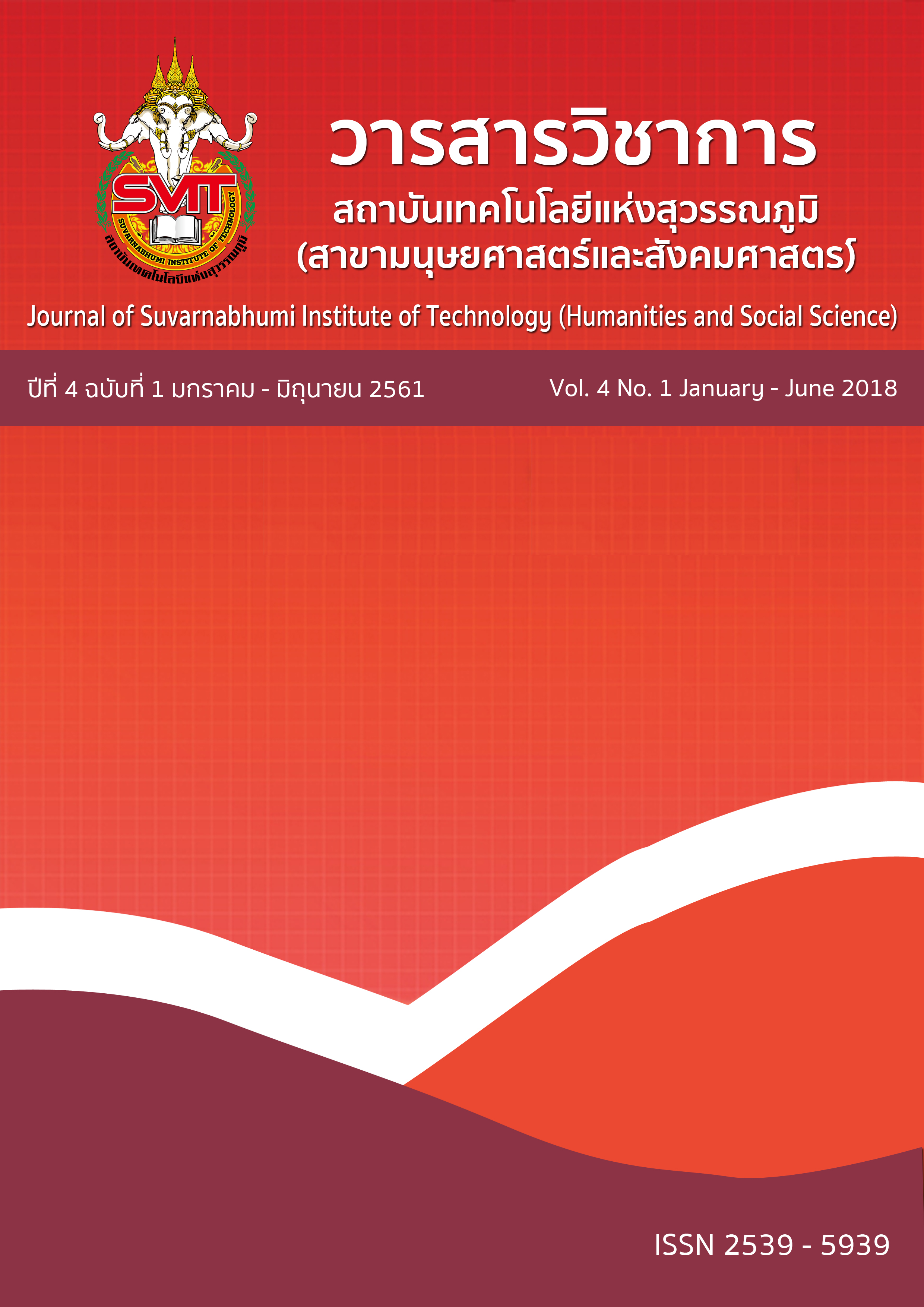The Development of Indicators for Digital Literacy Skills of Teacher Students in Unlimited Admission University
Keywords:
Indicators, Digital Literacy, Teacher, Unlimited Admission UniversityAbstract
The purpose of this research was to develop of indicators for digital literacy skills of teaching profession program in an unlimited admission university. The research was conducted through convenience sampling in which the samples of the study were 219 students in an unlimited admission university. The tools used for collecting data consisted of an interview protocol and a 5 point rating scale. Use statistical software was used to analyze the data via frequency distributions, median, interquartile range, percentage, mean, standard deviation correlation coefficient and Exploratory Factor Analysis (EFA)
The results of this research found there were 3 factors and 11 indicators for digital literacy skills of students. The First factor application : skills had 4 indicators. The second factor : understanding skills had 3 indicators. The third factor : creative skills had 4 indicators.
References
ธิดา แซ่ชิ้นและคณะ.(2559). “การรู้ดิจิทัล:นิยาม องค์ประกอบ และสถานการณ์ในปัจจุบัน” วารสารสารสนเทศศาสตร์. ปีที่ 34 ฉบับที่ 4 (ตุลาคม-ธันวาคม 2559)
นิตยา วงศ์ใหญ่.(2560). “แนวทางการพัฒนาทักษะการรู้ดิจิทัลของดิจิทัลเนทีฟ.” ฉบับภาษาไทย สาขามนุษยศาสตร์
สังคมศาสตร์ และศิลปะ ปีที่ 10 ฉบับที่2 เดือนพฤษภาคม-สิงหาคม 2560
พิศุทธิภา เมธีกุลและคณะ.(2559). “การประเมินความต้องการจำเป็นในการพัฒนาการรู้เท่าทันสื่อดิจิทัลและพฤติกรรมการใช้สื่อดิจิทัลในการจัดการเรียนรู้ แก่ผู้เรียนของนักศึกษาวิชาชีพครู”วารสารมหาวิทยาลัยราชภัฏธนบุรี.ปีที่ 10 ฉบับที่ 2 กรกฎาคม-ธันวาคม 2559
พีระ จิรโสภณและคณะ.(2559). “ความรู้เท่าทันการสื่อสารยุคดิจิทัลกับบทบาทในการกำหนดแนวทางการปฏิรูปการสื่อสารในสังคมไทย” มหาวิทยาลัยธุรกิจบัณฑิตย์
วิทยา คำรงค์เกียรติศักดิ์.(2556) “การรู้เท่าทันสื่อดิจิทัล” เข้าถึงเมื่อ 20 มีนาคม 2561.เข้าถึงได้จาก http://www.infocommmju.com/icarticle/index.php?option=com_content&view=article&id=245:20
11-09-09-08-58-37&catid=11:%E0%B9%92%E0%B9%95%E0%B9%95%E0%B9%97-
%E0%B9%90%E0%B9%94-%E0%B9%92%E0%B9%92-%E0%B9%90%E0%B9%93-%M-
%S&Itemid=18
แววตา เตชาทวีวรรณและคณะ.(2559) “การประเมินการรู้ดิจิทัลของนักศึกษาระดับปริญญาตรีในเขตกรุงเทพมหานครและปริมณฑล” วารสารสารสนเทศศาสตร์. ปีที่ 34 ฉบับที่ 4 (ตุลาคม-ธันวาคม )
สำนักงานพัฒนาวิทยาศาสตร์และเทคโนโลยีแห่งชาติ.(2559).การรู้ดิจิทัล(Digital Literacy).เข้าถึงเมื่อ 20 มีนาคม 2561.เข้าถึงได้จาก https://www.nstda.or.th/th/nstda-knoeledge/142-knowledges/2632
สำนักงานเลขาธิการสภาผู้แทนราษฎร.(2560). “ทักษะดิจิทัล: การพัฒนาประเทศสู่ Thailand 4.0. วลัยรัตน์ ชายท้าวบรรณารักษ์ชำนาญการ กลุ่มงานพัฒนาทรัพยากรสารสนเทศสำนักวิชาการ : มิถุนายน 2560
สุภารักษ์ จูตระกูล.(2559). “ครอบครัวกับการเรียนรู้เท่าทันดิจิทัล (Digital Literacy) ของดิจิทัลเนทีฟ (Digital Natives)” วารสารวิทยาการจัดการ มหาวิทยาลัยเชียงราย 11,1 (มกราคม-มิถุนายน):131-150.
สุวิมล ว่องวานิช. (2546). แนวทางการให้คำปรึกษาวิทยานิพนธ์. กรุงเทพฯ: ศูนย์ตำราและเอกสารทางวิชาการ.
Hair, J.F., Black, W.C., Babin, B.J., & Anderson, R.E. (2010). Multivariate Data Analysis. Seventh Edition.
Prentice Hall, Upper Saddle River, New Jersey.
JISC. (2014). Developing digital literacies. Retrieved 1 August 2017, from https://www.jisc.ac.uk/guides/developing-digital-literacies
Ng,W.(2012).Can we teach digital natives digital literacy?.Computers & Education,59(3), 1065-1078
Hague, C. and Payton, S. (2010). Digital literacy across the curriculum. Bristol:Futurelab.
Downloads
Published
Issue
Section
License
The articles published are copyrighted by the Sarasas Journal of Humanities and Social Science. The opinions expressed in each article in this academic journal are those of the individual authors and do not reflect the views of Sarasas Suvarnabhumi Institute of Technology. The authors are solely responsible for all aspects of their respective articles. Any errors or inaccuracies in the articles are the sole responsibility of the authors.



